This online discussion is open for comments November 12-18. The assignment description and grading requirements are available here.
Music has the power to convey messages—through its words, because of the context where it’s played, because of who’s playing it, and because of our associations with similar musical sounds. (The study of how music is able to convey messages, imply ideas, or communicate subtleties to nuanced listeners is called semiotics.) This week, we’re thinking about how violence is enhanced by music, inspires music, and allows music to take on new meaning. The focus will be on 20th– and 21st-century wars (World War II, Vietnam, Iraq/Afghanistan post-September 11th), but we’ll listen to four different areas of music in wartime: nationalism, the human toll of war, music as protest, and music as war.
I. Nationalism and patriotism: Music to unite the people
Nationalism (celebrating one’s nation) was a common political and musical theme in the 19th century, with nationalistic music being composed and celebrated all across Europe as the nation that populate the map as we now know it were being formed: Italians rallying around the king of a newly unified Italy (Vittore Emanuele II) and using the operas of Giuseppe Verdi (1813-1901) to do so, Antonín Dvořák (1841-1904) composing music that celebrated his homeland of Bohemia (now the Czech Republic), Edvard Grieg (1843-1907) doing the same in Norway, and Jean Sibelius (1865-1957) doing the same in Finland.
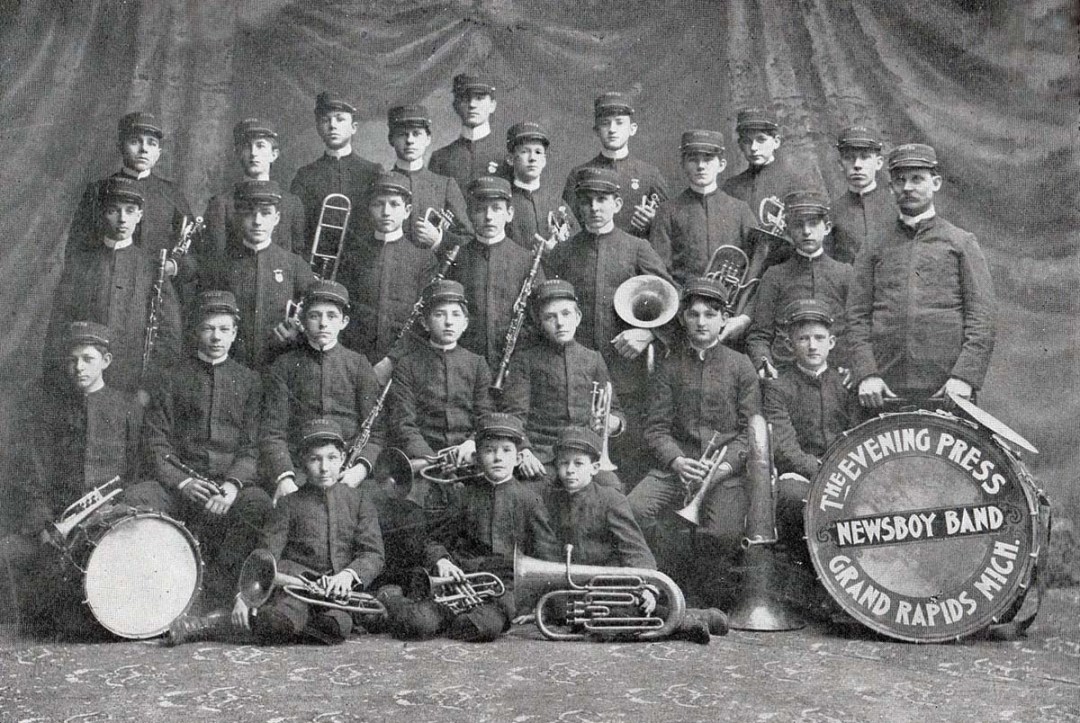
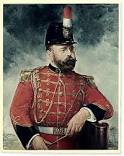
The same thing happened in the United States, particularly in the form of local town bands that played marches in parades after the Civil War. John Philipp Sousa (1854-1932), for example, made his career composing 137 marches and serving as Director of the US Marine Band and later his own professional band, the Sousa Band. One of his marches, The Stars and Stripes Forever (1896), was named the national march of the US in 1987.
Nationalistic music is often simplistic, with clear, obvious, and steady rhythms—things that can get a crowd of people clapping along, making them musically united as long as the music sounds. In music of this style, melodies are often clearly differentiated in the texture and are characteristically rousing, encouraging, or uplifting. The form of a Sousa march always concludes with a polyphonic texture [3:58 in the above video], allowing the composer to add depth and nuance of the idea he’s celebrating (i.e., America) by simultaneously layering different melodies on top of each other. On top of that, marches like these were played as part of larger patriotic displays, with flags waving, veterans marching, and stirring speeches—all things that resonated with and amplified the music’s message.
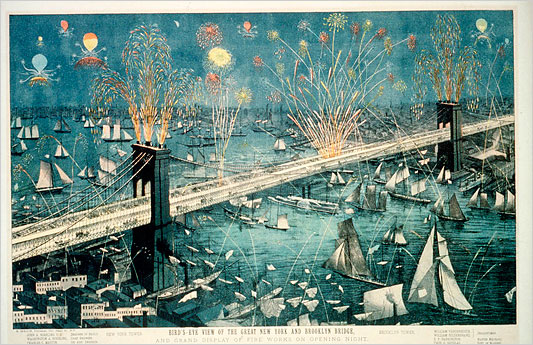
The last piece of nationalistic music I’ll leave you with is Toby Keith’s Courtesy of the Red, White, and Blue (2002), a song written during peak post-9/11 fervor that captures the ideologies of American protectionism, American exceptionalism, and anti-foreigner sentiment. It encapsulates everything we can expect from propaganda-music: it’s catchy and simple, it leaves no room for subtlety or nuance (“We’ll stick a boot in your ass / It’s the American way”), and it spreads a particular idea among a group for political purposes. The imagery of the video (gently billowing American flags, cowboy hats and cut-off sleeves of the southern working class, US soldiers in battle fatigues, and guns) reinforces the propagandistic message.
These are all examples of propaganda: music that conveys a political message, and this makes sense in wartime. In a time of crisis and stress on the population, anything that leaders or the military can do to build resolve and support for the long road ahead is a smart strategy. Music’s effectiveness as propaganda (i.e., manipulation towards political ends—the composer Christian Wolff (b. 1934) goes so far as to say that “All music is propaganda music.”) is based on the power of music to incite particular feelings and thoughts in your mind, especially when coupled with context, power, or a threat.
II. The human toll of war
The Crusades
Europeans have been fighting over the Middle East and fighting the people who live there for centuries. The Crusades were a series of wars fought by Europeans on behalf of the Catholic Church and the Western world for nearly two centuries (1095-1291).

These wars resulted in thousands of deaths, great tales and fables of bravery, the exchange of goods and ideas from East to West and vice-versa, and, of course, the capturing of prisoners. One such prisoner was the King of England, Richard I, aka Richard the Lionheart (1157-99). He was captured while returning home and held for ransom by Duke Leopold of Austria (1192-94). His traveling and captivity in the Crusades are part of the story of Robin Hood—his brother Prince John held the throne while Richard was away, overtaxing the people of England and generally being an inept ruler (with the help of the Sheriff of Nottingham).
It’s also part of the plot of the classic Katherine Hepburn and Peter O’Toole (and a young Anthony Hopkins) film, The Lion in Winter (1968).
But back to music!
While in captivity, Richard I wrote a song about his sorrow, resolve, and homesickness, “Ja nuls homs pris” (No man who is imprisoned).
No man in prison can tell his tale true
Lest he himself has known what I’ve been through
In writing song he may comfort renew
I’ve many friends but their gifts are few
They’ll bring dishonor for my ransom’s due
These two long winters pastMy noble barons and men surely knew
England and Normandy, Gascon and Poitou
Ne’re would I forsake or be untrue
To any friend; noble, commoner too.
I do not mean to reproach what they do,
Yet I remain held fast
World War II
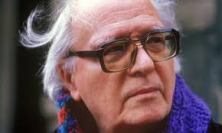
Olivier Messaien (1908-92) was a French composer trained at the Paris Conservatoire. When World War II broke out, he served in a medical unit in the French army but was captured in 1940 and sent to prisoner-of-war camp in Poland called Stalag VIII-A. One of his German guards recognized him and provided Messaien with everything he needed to continue to compose: sheet music, pencils, a piano, and instruments that could be played by the other professional musicians in the camp (clarinet, violin, and cello).
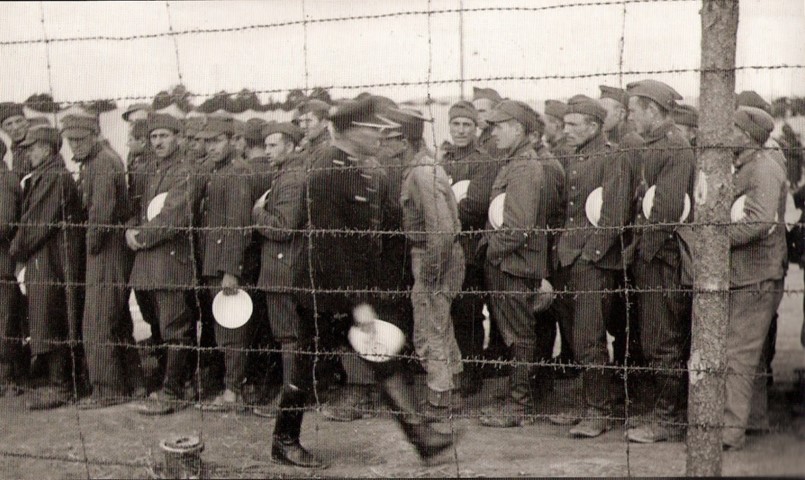
Messaien wrote a work that he called Quatour pour la fin du temps (Quartet for the End of Time)—an ominous and heavy title that reflects the feeling of the entire world coming to an end as much of France was destroyed by the German occupation, as winter settled on the camp, and as the prisoners couldn’t find out whether their families were still alive. Two important factors shape the sound of this piece: (1) the instrumentation, and (2) Messaien’s religious faith.
There were three other professional musicians imprisoned in the camp, a clarinetist, a violinist, and a cellist. The guards were able to procure instruments for all of them that were, by all accounts, terrible but playable. Messiaen’s quartet is special partly because no composer had ever previously combined these instruments—this piece is driven by the limited resources available to the composer.
In addition, Messaien took great comfort in his faith—he was Catholic—and his inspiration for the piece came from the Book of Revelation in the Bible that he experienced in a dream:
“And I saw another mighty angel come down from heaven, clothed with a cloud: and a rainbow was upon his head, and his face was as it were the sun, and his feet as pillars of fire…and he set his right foot upon the sea, and his left foot on the earth… And the angel which I saw stand upon the sea and upon the earth lifted up his hand to heaven, and sware by him that liveth for ever and ever… that there should be time no longer: But in the days of the voice of the seventh angel, when he shall begin to sound, the mystery of God should be finished.”
—Revelation 10:1-7, King James Version
Messaien regarded death and destruction on Earth not as a terrible end but as a hopeful beginning, the chance to begin eternal life in heaven. Here is the end of Quatour, in which you’ll hear very long notes in the violin reaching ever higher, on top of chords, two at a time, in the piano—the violin calm and graceful no matter what the piano does underneath, and the symbolism of ascending to heaven is pretty clear. The premiere, held outdoors in the middle of winter, was attended by the guards and inmates of the camp, who were already weary of the war and held in rapt attention for the entire work. Describing the experience later, Messaien said, “Never have I been heard with as much attention and understanding.”
World War II, continued

Polish composer Krysztof Penderecki (b. 1933) composed the next work without a title or inspiration in 1960, and only after he had written it and grasped how intense, emotional, and catastrophic the piece sounded did he give it a name: Threnody to the Victims of Hiroshima.
A threnody is a kind of song, hymn, or ode for someone who has died; it has a wailing quality and is often performed as a memorial. Hiroshima was the site of the first atomic bomb detonation in wartime, on August 6, 1945.
III. Music as protest: Giving voice to those not in power
Music played a large role in American anti-Vietnam War protests in the 1960s, expanding protesters’ message beyond just disagreement with a specific war to a broad, public polemic against all violence. Woodstock (August 15-18, 1969) was the capstone of ongoing protests by young, often white and middle class Americans against the use of violence generally, the Vietnam War specifically, and other ideas that they associated with “the establishment” (their parents’ and grandparents’ generation who were in charge of the social, political, and governmental structures that led the country into this morass in the first place) and all things the establishment stood for: the American Dream, being uptight or “square,” capitalism, anti-drug use, monogamy and heterosexuality, and—of course—anti-rock music.
The power of Woodstock and the music by rock and folk musicians who performed there lay in uniting a large group of people (400,000 attendees plus more who sympathized but couldn’t attend), articulating a message contrary to that espoused by people in traditional positions of power, and doing so in a way that was pleasant, persuasive, and enticing for a certain group: young people liked this kind of music and were drawn to it, whereas older Americans were not.
Performers included rock bands (Grateful Dead, Creedence Clearwater Revival, Janis Joplin, The Who, Jefferson Airplane, Joe Cocker, Crosby Stills Nash & Young), world music and fusion groups (Santana, Ravi Shankar, Sly & the Family Stone, Blood Sweat & Tears), and folk singers (Joan Baez, Arlo Guthrie).
Here’s Country Joe McDonald performing Vietnam Song which he wrote specifically for the festival:
Jimi Hendrix played the last set of the festival (approximately 130 minutes long), and his solo performance of The Star-Spangled Banner (the US national anthem) was particularly powerful because it was both an extraordinary display of his skill and creativity as a guitarist as well as a musical protest—it audibly and prominently distorted the melody and form of national anthem, and in the process re-purposed it from a bland, patriotic gesture into a personal claim: “There is room in America for me, for people like me, for my ideas, and for me to shape America into the country I want it to become.”
Coming on the heels of the Civil Rights movement (1919-68), the assassinations of Malcolm X (1965) and Martin Luther King, Jr. (1968), and in the middle of general dissatisfaction with the country, Hendrix’s performance made a powerful statement.
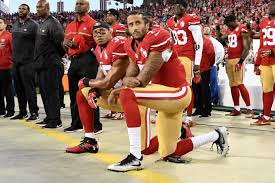
US football player Colin Kaepernick’s protest of the national anthem during the fall 2016 NFL season can be seen in the same context. As a racial minority in the US, Kaepernick listened to the anthem, saw the display of celebration and pride that it encompassed, and found those to be in dissonance with his experience as an American and the experience of other Americans. Rather than stand during the playing of the anthem at San Francisco 49ers games, he took a knee on the sideline, causing uproar for viewers who took his gesture to be a direct affront and insult to members of the military. The fact that his gesture could be interpreted so differently speaks to the powerful place that the anthem occupies in people’s imaginations and how strongly they associate the musical sounds with political ideas.
Kaepernick’s gesture also encouraged a broader re-examination of the Banner itself, which was written by Francis Scott Key following the Battle of Fort McHenry in Baltimore during the War of 1812. (It became the US national anthem in 1931.) The song has four verses, but we typically only sing the first in public events today. The third verse, which celebrates the deaths of slaves who were promised freedom by the British if they defected to the Royal ships in the harbor but were killed by American fusillade, makes the song problematic.
No refuge could save the hireling and slave
From the terror of flight or the gloom of the grave,
And the star-spangled banner in triumph doth wave
O’er the land of the free and the home of the brave.
Because the national anthem is a powerful symbol of the nation it represents, a person who questions it or seems to lack complete faith in that symbol can be interpreted as disrespectful, not just of the song but of the nation itself. This conflation is an example of false logic, obviously, but also the fact that such a reaction is possible shows just how effective the song is as a piece of propaganda. Kaepernick’s career seems to be over as a result of his protest, further underscoring the weight people ascribe to the anthem as a patriotic symbol.
IV. Music as war
Armies have been using music in battle as long as there have been battles. Drums keep armies in step, trumpet fanfares signal which units should advance, and the enemy can hear music of an approaching army long before they see them—allowing fear to set in if the approaching army sounds big and powerful.
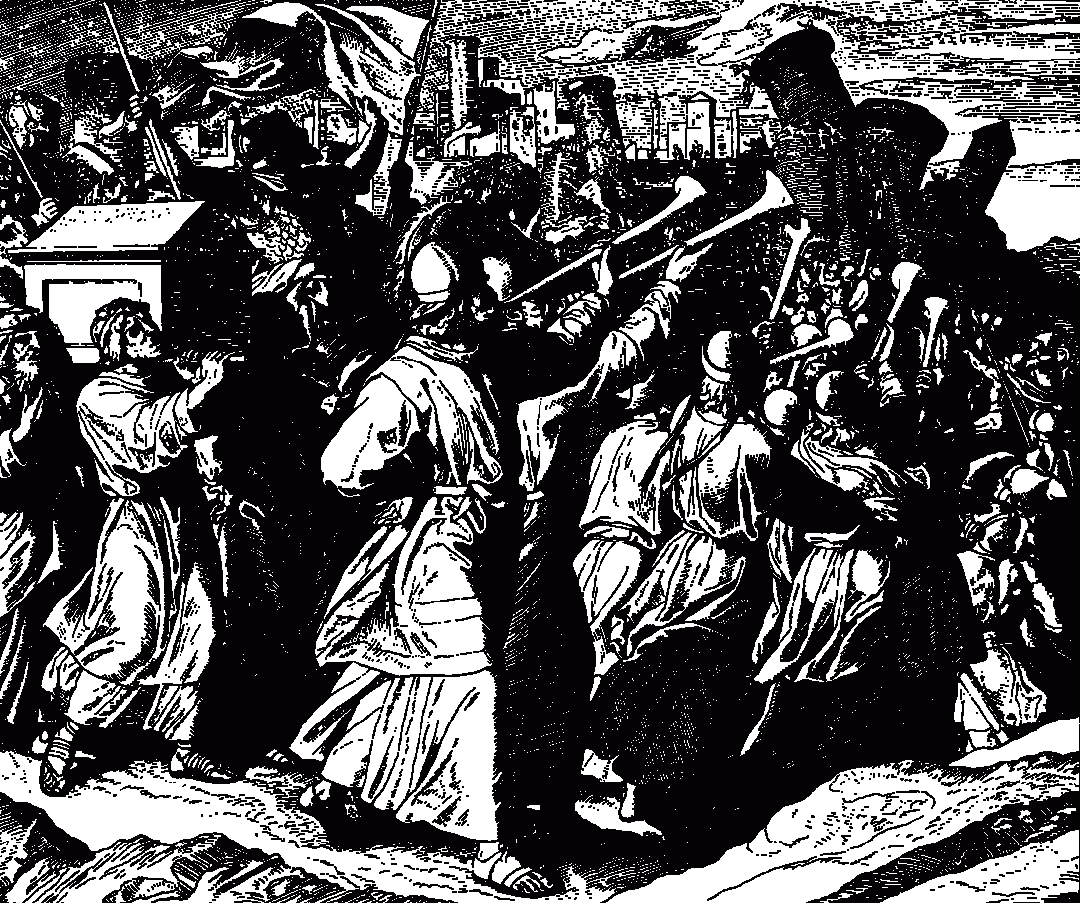
During the Ottoman-Habsburg Wars (1526-1791), Turkish armies made use of psychological warfare by having their Janissary bands perform outside the walls of a city under siege, psyching up their own troops and intimidating the citizens trapped inside. For Europeans, the Turks’ use of percussion (especially metallic percussion) and nasal-sounding wind instruments would have been frightening because of its unfamiliarity, and large, coordinated ensembles of musicians can have an intimidating effect.
Music as psychological warfare continues today, and Jonathan Pieslak’s book Sound Targets: American Soldiers and Music in the Iraq War (2009) explores how American troops and interrogators typically use heavy metal and rap to pump themselves up for battle and to rattle prisoners during interrogations. Alex Ross’s excellent article “When Music is Violence” in The New Yorker (2016) summarizes Pieslak’s book and other instances of music being used to inflict harm on others: Ross – When Music Is Violence – The New Yorker I strongly recommend you read this essay, as it is an excellent piece of writing and shows how broadly you can approach the idea of listening to music, something you’re going to be thinking about for your own upcoming Student Blog Post.
Final thoughts
It’s difficult to talk about war without also thinking about censorship, the control of the spread of ideas. Music is a powerful means of conveying messages, and the potential flip side of this power is the rejection of that message (and the messenger/musician) in the form of boycotts, commercial failure, and censorship.
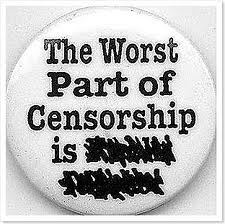 Art is a way to express ourselves at our best, or at our most profound, or ourselves in our best image. And it’s a way for us as listeners to explore, empathize with, and experience other people’s lives and perspectives. The arts and literature are among the first targets of tyranny and censorship because they open people’s eyes – to different ways of life, to different perspectives, to alternative realities. We humans are by nature inquisitive creatures, and when confronted with something new, we ask ourselves how it could exist, what has caused it to come into being. We imagine what sort of person might have come up with a piece of art, what kind of world a person who writes a certain song could live in. And if we start imagining other people and other perspectives, we might be tempted to change our own, and that is the wonderful danger of art.
Art is a way to express ourselves at our best, or at our most profound, or ourselves in our best image. And it’s a way for us as listeners to explore, empathize with, and experience other people’s lives and perspectives. The arts and literature are among the first targets of tyranny and censorship because they open people’s eyes – to different ways of life, to different perspectives, to alternative realities. We humans are by nature inquisitive creatures, and when confronted with something new, we ask ourselves how it could exist, what has caused it to come into being. We imagine what sort of person might have come up with a piece of art, what kind of world a person who writes a certain song could live in. And if we start imagining other people and other perspectives, we might be tempted to change our own, and that is the wonderful danger of art.
-Dr. J.
Some questions to get the conversation started
- What human experience do you think music is unable to capture or portray?
- If you were a musician captured in war, what kind of music would you be inspired to create?
- What aspect of Ross’s essay did you find to be the most interesting?
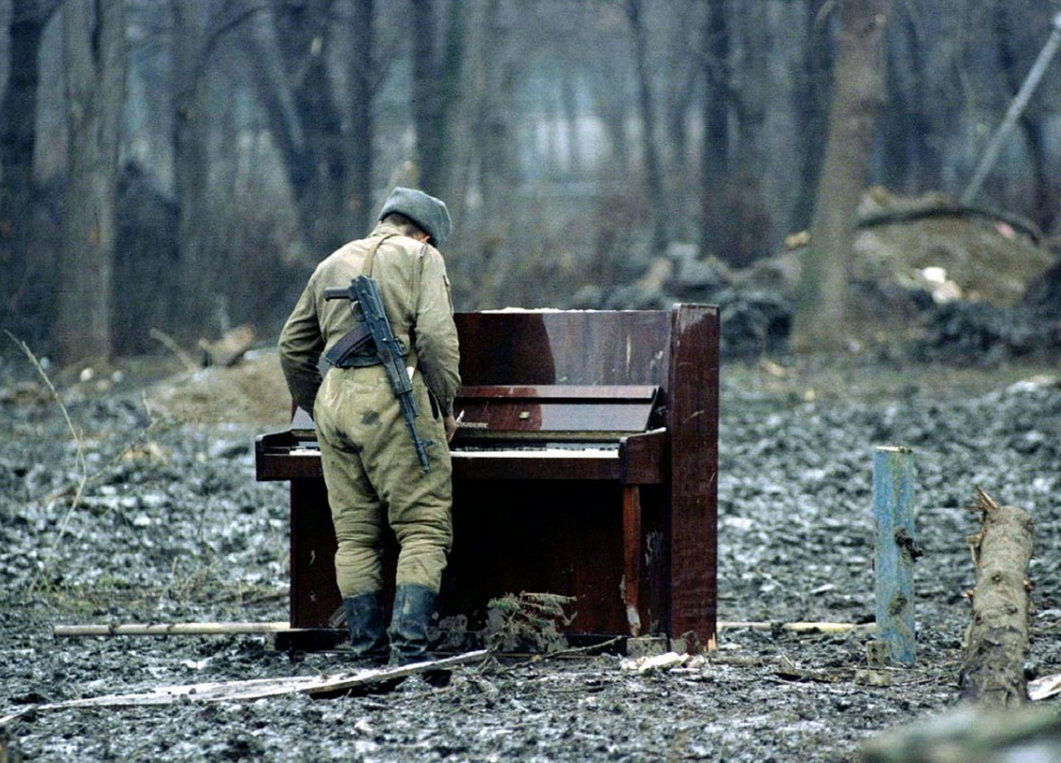


If i was a musician captured in war, I would be inspired to create rap music. I would constantly practice on my freestyle even without a beat until I could endlessly be able to spit for countless hours. I feel that if I practice enough I could be better than most rappers in this generation. I would work to be more lyrical and hype at the same time and get feedback from cellmates. The cellmates from there will hype me and I will become famous in jail or prison. The cellmates would spread my name to even outside the jail or prison and I will slowly turn famous and move to California to pursue my music career. I would love to work with Gucci Mane, Drake and and 21 Savage on my way to fame on the come up. Similar to how Turkish armies made use of psychological warfare by playing war music outside the walls of a city my freestyle will scare away all my enemies in the rap game.
LikeLiked by 1 person
I agree with what your saying, if i was a musician captured in war i would take the same path you just talked about. I’m used to listening to rap music now a days, so i would try to become a rap artist in the cells. I would imagine to have cellmates to be on my side and give me a hand. I would just read books honestly, to strengthen my vocabulary for my lyrics. I would hope my name makes it out from the walls by my cellmates or maybe even the guards would enjoy it.
LikeLike
Were you a musician trapped in war recently? Lol I like your plan!
LikeLike
I like your idea I would do the something. I’ll also make the prison more lifely and I will pass the time because you know I am capture whole against my wills, and ill try to be so big that people will know about me and try to get me out
LikeLike
In my own opinion, i believe that music is able to capture every human experience. I can’t think of one scenario where music hasn’t been able to express how i feel. For example, getting your heart broken results in listening to Drakes “Marvin’s Room”. Or if you just aced your test, you can listen to Travis Scott “Sicko Mode”. There are so many songs to describe so many events and the fact that emotions are usually poured out into songs, it adds meaning to what it truly is. Music is a worldwide language and everybody knows how to speak it.
LikeLiked by 1 person
I agree with you on this I personally like listening to the weeknd when getting emotional or listen to something else to get my mood up. The song or type of music really sets the mood for the emotional feel you feel
LikeLike
that’s true, I feel like music reflects on your mood.
LikeLike
Does it make people violent?
LikeLike
i think that it depends on the person and on the environment that the music is listening. if the environment is violent, then people are going to react violently.
LikeLike
What I really want to know, is why rappers feel compelled to graphically describe the violence.
LikeLike
Rap is often a engaged style of music, it is there to denounce, and provoke people. Indeed, rappers use this art to share what is wrong or just expose their daily lives. We must also categorize the different styles of rap, those with commercial vocations with little background and those being less known but carrying a message well present. If the rapper comes from difficult backgrounds, he may have and I say maybe, more likely to popularize and denounce the difficult situations of his neighborhood. Music is an art, lyrics are the basis, so using a few shocking lyrics is ideal to say loudly what everyone thinks in a whisper. Rap seeks to hit the spirits with punchlines. After, we must not believe that all rap is so, it is not true, but the verbal violence and a certain regressivity compared to the accepted civility characterize the format of many rap texts.
LikeLiked by 1 person
Imagery
LikeLike
I can really agree with you because when i be in my feelings i be listening to Queen Naija , Bryson Tiller etc. but when i listen to them i just go so hard when I’m singing ill probably end up crying
LikeLike
Couldn’t agree more with your comment because it’s so trey there’s a song for every emotion you’re feeling and every happiness or sadness. You will definitely connect with some songs lyrics
LikeLike
I definitely agree with what you’re saying, music has power over everyone and allows us to feel certain ways when it has to do with certain emotions. Some songs or music pieces even bring out different memories and different things we are able to remember through music.
LikeLike
Music during war can portray a lot of things. For instance it can relieve you temporarily from stress because you catch on to its flow and it takes your mind off things for a while. Also music can portray a rush of adrenaline into the body and you could end up fighting harder for what you believe in or because the music brought back the spirit in you and you were motivated even further. This happens because in music sometimes there is a powerful message that is kind of preach through the song, like in the great World War Yankee song made the New York militants fight harder according to a documentary.
LikeLiked by 1 person
i agree with your comment because during wear times soldiers and civilians were very stressed out so listening to music that calmed them down and relieve was really good.
LikeLike
Yes! I didn’t think of music in war in that way that it can distract you instead of influencing and promoting a side from the war.
LikeLike
@Tahir I strongly agree with your point in that a variety of emotions can be associated with a war and thus music can be created to reflect all of them.
If I were a musician captured in war, I would be inspired to make music which reflects what I feel or the general mood of the atmosphere. From knowing the things that occurs in a war, I think I will feel fearful, anxious, depressed, and long for it to be over. Therefore, I will make music to reflect the state of chaos and instability. To reflect my tension, anxiety, and the unpleasant circumstance around me, my music will have a lot of harsh, dissonance sounds, and will probably be written mostly in a minor key to reflect the state of gloom. But there may be others who feel hopeful (that the war will end), so I may also be inspired to create music which reflects a feeling of relief and sense that freedom is near. I would incorporate the sounds of trumpets and brassy instruments to create a mood of celebration.
The music will definitely be dependent on how myself and others around me take the situation because many themes/moods can be reflected about a war, and music definitely has the power to express all of these moods (stress, anxiety, tension, sadness, fear, anger, hope, and even triumph if you’re on the winning side of the battle).
LikeLiked by 1 person
I think music is a motivation as well, the music it self would make us feel good or gives us courage to not be stressed. I am not saying that a person would totally forget what he or she is going through but i can say just for minute or two it will make you thinking about any other thing.
LikeLike
I also agree, music was used as a distraction during that time.
LikeLike
If I was a musician captured during war, I think the music I would be inspired to make would be music that was very realistic to reciprocating a battlefield. I would want listeners to get a sense of what I am going through, by listening to my music. Not only would I focus on my lyrics being powerful or moving, but I would also focus on the sounds in the background of my music. I would want there to be sounds of screams or crying, radios, and cannons in the background. I don’t think that there is an experience that music can’t create, because everyone has had their own fair share of reality. What I do believe is that not everyone would be able to create the same type of experience, because experience is subjective. Music however is able to reflect all types of emotions, concepts such as death or god, nature, basically anything the mind can think of. I feel that there is always a song to express how I am feeling, even when I can barely explain it myself.
LikeLike
I actually saw a movie based on a true story of a famous piano composer. Where he was captured for being jewish and one nazi soldier helped him by getting him out of the camp. If I were a musician being kidnapped during war my music pieces would be stories. The stories of my experience and the people around me that I meet. Also include the events and how it makes me feel to be in the place im in. I’d write about the ones experiencing this with me and how it is affecting us. A song has bought many people together at times and events.
LikeLike
I believe the film is “The Pianist” by Roman Polaski, starring Adrian Brody. It’s a great film, and I was just about to mention it. Though you beat me right to it!
LikeLike
If i was a musician captured in war I would simply write poetry cause that’s basically what rap music is, because what more can you really do while you’re locked away? lol
LikeLiked by 1 person
Right because if you really look at it most rappers now a days ended up in jail and once they go out they want to become rappers
LikeLiked by 1 person
And almost every rapper has faced challenges his or her life to be here where they stand today.
LikeLike
And almost every rapper has faced challenges his or her life to be here where they stand today. And for their music to be so soul snatching
LikeLike
And almost every rapper has faced challenges his or her life to be here where they stand today. And for their music to be so soul snatching. The way a artist sings says a lot about how they faced they’re challenges
LikeLike
Do you think that only artists who have experienced hardships can create good music?
LikeLiked by 1 person
And almost every rapper has faced challenges his or her life to be here where they stand today. And for their music to be so soul snatching. The way a artist sings says a lot about how they faced they’re challenges.
LikeLike
That’s a fact. That would be the only thing that would keep from going crazy from being locked in a cell
LikeLike
Exactly, these are things that can take your mind off of the situation for a few moments.
LikeLike
“If you were captured in war …?”. I would create music that would resonate with the others prisoners I suppose. Anything to sway people over to my side; to see my view. So that when the time comes me, and the people, I’ve been able to inspire would fight back against those who took us captive ( Maybe I’m, not being realistic). And on another tangent, I believe that the use of music as a form of psychological warfare is a very real one. Sometimes when I used to get in trouble at school, and I knew I would hear from my Dad about it when I got home, my sister used to play his ringtone. And when I heard that, I just got so terrified because that meant that he wasn’t very far away. So yeah, it’s a great tactic. Music is definitely able to reflect all emotions, as people often say “there’s a song for everything”, and whoever first said that quote was clearly on to something. Sometimes when I’m feeling a bit dramatic, I like to listen to Kali Uchis ” Know What I Want”, versus when I’m feeling very much against the system I’ll play “Who The F*ck Are the Arctic Monkeys”. The music I listen to very much depends on how I am feeling at the time. Music transcends just about very plain there is, and frankly that’s amazing.
LikeLiked by 1 person
I’m sure there are experiences music is unable to capture, music captures emotion mostly, and although lyrics could capture visual descriptions, lyrics can only describe so much. I’m assuming if I was making music in a war they’d be really depressing songs. I’d probably have the image of war stuck in my mind and all of the brutal things that come with it. It’s a really traumatizing experience to live through, how could someone think about anything other than that?
LikeLiked by 1 person
Couldn’t agree more with your comment because it’s so trey there’s a song for every emotion you’re feeling and every happiness or sadness. You will definitely connect with some songs lyrics
LikeLike
I agree if some body writes a lyrics that would be very sad. I think every body would do different stuff in that situation, some would be starts making music or some would not even think about it but yeah a this is great you would express your feelings like that.
LikeLike
in some way maybe, but im a still believer that music can still convey most emotions. their is music to most feelings and emotion that one feels
LikeLike
The New Yorker July 4, 2016 “From trumpets at the walls of Jericho to pop songs as torture in the Iraq War, sound can make a powerful weapon”.
To quote the standard platitudes, “it has charms to soothe a savage breast; it is the food of love; it brings us together and sets us free”.
I have never had a chance to look at the violent side of it, but Rap music most times can stir emotions of anger and aggression than can lead to violence especially at times when we feel someone has wronged us.
Some people look up to artist as role models and some may tend to feel that it’s ok to say and do the same as they do. It’s about the music and the words and what they suggest and how it is perceived.
We look at old War movies and the soldiers are always singing. You look at slavery and the slaves constantly sings, for the solder it perhaps gives them courage and for slaves it probably comforts and keep them going. I don’t really listen to rap music that often because you can hardly understand what some artist are saying.
For me if I were to make music in war it probably would be depressing or it will probably songs of strength and hope.
LikeLiked by 1 person
if i were a musician captured in war i would create a piece that would have a message of freedom and stopping the war soon as possible. war is something that both sides loses: land, family friends, and time. when creating my music i would like not to just influence the guards and soldiers to stop the war but to also inspire my cell mates and other prisoners that there is hope at the end of this and that time that we have on this earth should be spend wisely even thou we are here in the prison camp. that leads me to talk about what i found interesting in this reading, the impact on how tragic events happen around the world having the strong ones come out and take a stand reuniting everyone through music creating a new tradition that we follow today to remember that things we lost in the past. however the sad truth is that music isn’t able to influence everyone in the same way. to be clearer one’s tragic event can mean a celebration for others. there is always a limit to everything, even in music. if we can all come together as one, push each other forward to a better future but due to different governments, politics and religion its something close to impossible to unite people with just music.
LikeLiked by 1 person
Music is a way to describe what people feel and think. Its amazing how every single song out there portrays a powerful message to the world where it can capture peoples attention and sets them in this mood, where they can reflect on their past. That’s what makes music so beautifully, can just change your entire mood.
LikeLike
And almost every rapper has faced challenges his or her life to be here where they stand today. And for their music to be so soul snatching. The way a artist sings says a lot about how they faced they’re challenges.
LikeLike
I completely agree with your statement, some rapper that have been in jail take that experience and write about it and bout what they were feelings. They even increase how much they write because there isn’t really much to do in jail, I kind of think that’s where some rappers are made because jail is such an violent place that they turn to writing to have something positive during their experience.
LikeLike
I agree with you. Every song has its own message but also each person has different way of understanding the message since we have different life experiences.
LikeLike
Music is so different now a days, yes there’s classical music is still around today but music is an inspiration to most people. Music can make you feel different it can also put you in many different moods trust me i know from experience like if i listen to reggae I’m ready to go to a party! once i listen to soft music I’m relax etc. music is something serious lol
LikeLike
To address the question of what aspects of human experience music is unable to capture or portray:
Quora.com defines the Human experience as “the ability to process memories by the conscience mind; it is the result of the mind’s interaction and liaison between your physical body and the non-physical or spiritual soul.” Human experiences involve the conditions, key events, and situations that human beings experience in life, which compose of the essentials of existence (the things humans must experience as they exist) “such as birth, growth, emotionality, aspiration, conflict, mortality,” etc. By that, I think music has the ability to capture most human experiences such as the emotional, scientific, social, ethical, aesthetic, and religious. In other words, it captures the intangible and abstract things (like moods, beliefs, values and emotions) that comes with the human experience. However, music cannot capture the physical aspect of the human experience. The actual occurrence or moment in time that the human is experiencing ‘the experience’ (so to speak) cannot be captured by music. So, I believe the physical and time aspect of the human experience is what music fails to capture.
LikeLiked by 1 person
That’s a really good point. I do feel like music can capture the physical aspect because you can physically feel something and time can be felt in music. The slower the music and time feels like it’s slow moving and same with fast.
LikeLike
The way that article informed the readers descriptions about nationalistic music reminds me of military marching music which falls into same categories as article mentioned. For example, simple, clear, obvious and steady rhythms, all these descriptions could be a good explanation of the military marching song. I also believe in certain types of instrument make people fearless and give them confidents. I also think the purpose of the music that is played in anything related to military is very loud. In my opinion, Purpose of composing music in loud dynamics is to make enemies feel fearful and show them that we are stronger and more powerful than you. I believe music has enough power to fit into many different categories.
LikeLiked by 1 person
To answer the question If you were a musician captured in war, what kind of music would you be inspired to create, I will probably do music that helps motivate me or give me hope. Music can be a way of motivation and resources but also through the music we can tell a story, so without a doubt I will make music that will tell my story, my experience during the war and my capture for the new generation to know what was like to be captured during a war.
LikeLike
It’s really interesting to learn that music is not at all innocent and how it seriously is a form of expression that words and actions can’t do. If I was a musician captured in war, I’d want to create music that describes the time and to encode messages in the lyrics in case my allies could hear and bring aid and support. Also, I would want the music to inspire the people to support my side in the war obviously. How can musicians captured in war like say in the Middle East, create music if they wouldn’t have access to any resources and most likely in solitary confinement?
I feel like music can capture anything from the human experience. It can capture our moods, feelings, thoughts, sceneries and experiences from every aspect our lives. I can imagine music being able to capture the feeling of giving birth, and the approaching of death. But it would be all dependent on perception of the individual. I can’t imagine anything that music can’t portray.
In Ross’ article, I found it really interesting to learn that music was used as a form of torture. I’ve heard of this before, but I never knew how extreme it could be. I can’t believe music by Christina Aguilera was used because she’s a female. I can believe kids music or heavy metal music being torturous because of I would personally find it painful to listen, but I didn’t know it was actually a legit tactic used by militaries. It is true that music can be violating because there’s nothing that can block our sense of hearing and that really got to me. I now know music can be healing and music can also be weaponizing. What about silence? Can it be healing? Can it be vexing? How?
LikeLiked by 2 people
If I were a musician captured in war, I’d create classical music with no lyrics because in my opinion, the war is more about person’s emotions than events to tell about . For me classical music is the best way to express emotions because words can not completely express what a person can go through.
LikeLiked by 1 person
This is one of the reason I like classical music. It leaves things to the imagination because everyone goes through different things but the rhythm, melody hits the soul.
LikeLike
I think Ross essay give a very deep analysis of the link between music and violence. I never really thought of music as being used in such a violent way or as being violating. A very interesting critique of music! I always thought of it as being soothing or being used for positive motives. I thought it was very interesting the way Ross describes how sounds violates us, which therefore adds to music an aspect of violence. I liked how he contrasted the eyes to the ears. He says the eyes has the ability to block off things it doesn’t want to see, however, the ears is incapable of doing such. Hence, sounds/music most times comes “rushing in,” whether we want to hear it or not, therefore violating us and there’s nothing we can do to stop it. In his description of sound he says, “immaterial, it breaks all barriers…hearing it is not like seeing it. What is seen can be abolished by the eyelids, can be stopped by partitions or curtains can be rendered immediately inaccessible by walls. What is heard knows neither eyelids, nor partitions, neither curtains, nor walls … Sound rushes in. It violates.” He describes sound as a “faceless intruder;” and says our ears “are being touched by invisible hands.” This makes it easier for music (harsh, unwanted sounds) to be used as a violent force to disturb or aggravate opponents in a battle.
LikeLiked by 1 person
Although adversity is always an unpleasant experience, it is always a catalyst for great and inspiring music. Conflict shows people that there is always something to rise above and proves there is a light at the end of the tunnel. The product of this violence doesn’t have to convey violence in turn either. I find it very hard to say there are any aspects of human life that can’t be conveyed through music.
LikeLike
Don’t wanna put a damper on the mood but i feel like a human experience music cannot portray is when someone is in a vegetative state… there may be music to portray how there loved ones feel but as far as the person themselves i don’t think any kind of music can be portrayed for them. when someone is in a vegetative state they have no awareness of themselves or their environment. (Not to be confused with a coma)
LikeLiked by 1 person
i agree with @ebonemilton20 because honestly if i were at war the Last thing i would be thinking is music. yet it is true everyone expresses themselves differently i personally wouldn’t be able to create anything my mind wouldn’t be focused enough. if i were at war i would only be able to describe what i see and hear so i guess in a sense i would be “war music ethnomusicologist”
LikeLiked by 1 person
I think that sometimes being around violence can create great music only because that may be the only root to happiness. Because you’re around so much negativity it drives you to want to create something positive and it is a great outlet to expressing your emotions about this dark time. Music to me empowers someone to rise above the negativity and what is going on around you does not define who you are or shouldn’t affect your mood even though sometimes it does. I believe that artist make music during these dark time periods because they want to uplift people’s spirits because violence can be very draining and also in a sense to give people hope.
LikeLiked by 1 person
Music is a great way to share feelings what the musician thinks or going through. Music is not all the time will make you happy sometimes it makes you sad as well, that all depends on what you have faced matches to the sad lyrics. But if I would talk about war, if I would be in that situation definitely I would not even think about war. How could that be possible you are in a very bad situation, at that time you don’t even care about anything could even think about music. I agree music is a great way to express feelings but yes I can say that after war i would definitely express my feelings through music whatever i go through during that war.
LikeLike
One example of how music is used as symbol of nationalism is a national anthem. Do you think countries have to have national anthem?
LikeLiked by 1 person
If I was a musician during war times, I would create music that would inspire the nation to come together during a time of need. It could consist of poetry, classical, rap or hip hop, just as long as it gives off that feeling of hope. Music that people can listen to and hope for a better future and say “we can win, we can survive”.
LikeLike
I agree if I was a musician that would be the my goal to keep people’s hopes high and to inspire others so that they can come together.
LikeLike
If I was a musician captured in war, I would create two styles of music. the electronic music and nationalistic music. The electronic music is loud, sharp, unstable rhythms, short texts, I like this electronic music because it may express my unhappy feelings, emotions, deeper of mind in horrible surroundings or environment. The nationalistic music is to show people who have same situation as mind; we should stay together to make us strong, love our country. After reading Ross’s article When music is violence, I’m first time know a term musical torture (I learn something new today). So surprise! music sounds could indirect or direct relate Iraq War, also music and violence can be a academic studies.
LikeLiked by 1 person
If I was a musician captured in war, I would create a music that would helped hold myself together. Probably classical music because it is relaxing.
LikeLike
I think that there is no aspect that can’t be captured because all our feelings can be described in words. if I were a musician probably created something with a meaning that can reach the feelings of a person and feel identified with the words of the song. the way music is used to promote people to feel about any situation like feel the need to fight in the war. is amazing that music can make us feel something about it.
LikeLike
When I heard the composer Messaien and what he composed while being imprisoned it was heartbreaking. Even the guards had a job to do but still gave him instruments to continue to compose. The guards only followed orders but they made sure music was still being made, this breaks barriers. Shows you how music breaks can overcome difficult times.
LikeLike
As we have seen over these past few discussions, music can be used as a coping mechanism and this is another example of how this is possible.
LikeLike
Music can make people feel motivated especially during times of war or trying to fix an issue in society such as women’s rights or police brutality for example . When music is played during a time of war or when people are trying to fight for their rights, it can motivate people to join and unite causing people to become violent.
LikeLike
I agree with all of you on how music can be really motivating in times of war and from reading the article how music has the power to do many things to us.Music is so powerful that can be used for good and bad depending on the person who uses it based on their motives.
LikeLike
Exactly…..music it used for everything. Music is the gateway to peace, well in my eyes it is.
LikeLike
I agree, Music is an outlet for all your emotions.
LikeLike
Does anyone feel that music that is meant to convey a bad message or to be used for bad reasons should censored?
LikeLike
Yes I do believe that. I say this because if you “hypothetically” had a child and he/she mysteriously came across that would you want them hearing every single thing? Or only some things to where he/she dont understand.
LikeLike
It is sometimes said “your thoughts run your life”. Whatever you think you shall become. If I were a musician captured in war, the kind of music that I would be inspired to create would be songs of hope, happiness and freedom. A peaceful melody of some sort. Not only would it be beneficial to me, but also to the others around me. Being in that happy state would give me a feeling of inner peace and freedom, as well as giving the other cellmates hope that we would all be free if we just believe and join as one. It would be an inspiration to the others, and it would help us all to cope with our depression and anger from being in there. The peaceful music in a sense will also help to create a barrier from the dark thoughts to a more pleasant comforting feeling. Chanting the peaceful harmonies will give me the strength and courage I need to get by, day by day.
LikeLiked by 1 person
If I was a musician captured in war, the kind of music that I would be inspired to create will be songs about our stories, about the community, how they live during war time, how kids were. I specially will talk about kids because I think they are important and are the future of our world, and I will do it to because it will be good to show people how kids suffer on war.
LikeLike
What human experience do you think music is unable to capture or portray?
If you were a musician captured in war, what kind of music would you be inspired to create?
What aspect of Ross’s essay did you find to be the most interesting?
Music and violence, I think, have become a thing that intertwine on a daily basis. I’m not sure if it is, however, in the same way it used to be correlated. Music, back then, was used in war as a show of patriotism, and to encourage soldiers to go out and fight. Now, many rappers use music as a form of coping mechanism. For example, rappers like Eminem talk about killing people in their music, or hurting someone in some way, which helps them distract from doing so in real life.
Music, I think, is also used to distract people from the horrors of the world. For example, yesterday, I was re-watching Titanic, and one scene from there astounded me: the ship is sinking and people are being transported to the limited amount of boats and the musicians are being told to play something cheery to distract the passengers from the panic. It amused me because I’ve never thought of this scene in depth and now that I see it again after years, I’m amused and somewhat angered by the fact that the captain i normalizing such a terrible situation.
Similarly, in wartime, people may be inspired to play cheerful music to remain oblivious to the tragedies of war, or some may be inspired to create really violent music to cope with what they cannot control.
LikeLike
Writing music during the war time, has its pros and cons. Why? Because people have different views some people agreed with war and some don’t. I would be making music for people who felt caged. Like for instance, Look at N.W.A. They made a song called F*** the police when police brutality was extremely high and because that’s what people were feeling at the time they had a large fanbase. Also because of the song there were lots of riots against the police.
LikeLike
I think music can express all human experience, the only reason that people cannot understand the music is the people have no understanding of the experience. For instance, I had born in a peace age, when I was a kid no understanding of war music. As I become an adult, I understand war by reading and watching movies; I believe I vagueness of interpreting the war and the music of war. The ward in the title” violence” reminds me of rap; I like rap and its style. But for some rappers, they use dirty talk as lyric which content violence and badly influence teenagers.
LikeLiked by 1 person
I feel the only experience music can’t portray is death. Music is a reflection of what you’re going through. A person can write about being ill and slowly dying but they can’t write about the actual death experience when they took their last breath. War music should be upbeat keep everyone energized but also motivated.
LikeLike
An artists can’t express the experience of death but perhaps they can express what it feels like to lose a loved one or someone they care about.
LikeLiked by 1 person
I think music has always been a way for an artist to express how they feel using a platform that they can’t express any other way. When drill music artists from Chicago express their lives through their music others choose to label it is as violent but never choose to look beyond that music at the reasons these artists are making music so “violent”. The reason being that the music is a reflection of what they experienced growing up.
LikeLiked by 1 person
honestly i believe theres a song or genre for every mood imaginable, honestly thats what i do , depending on the mood i am ill have a song stuck in my head that reflects it.
and if i was stuck at prison as a musician i dont think i would keep playing the same stuff i was beforehand , i think id be trying to new genres but i bet the pieces would be sadder with the fact that a person mind deteriorates after a long time in prison
LikeLike
Music during the war can definitely portray a lot of things. It can be destructive and on the other hand, it can bring comfort. Both outcome will depend on the genre of music that is being listened too, the person’s frame of mind at the time the music is being listened too. If the individual may have just encountered something traumatic, the person may want to listen to a piece that maybe soothing that will bring comfort and on the other hand another individual who experienced the same scenario may listen to a piece that is very instrumental and their adrenaline will place the person on a mental height that will drown out that experience. The bottom line is music is definitely needed for motivation.
LikeLike
Music has been a big influential factor in all of our lives, but specially during the times of war. Music kept people sane and gave them a sign of hope during the war, specially during World War II. Many prisoners were able to gain hope and maintain strong during their rough times throughout listening, composing and even performing these music pieces.
LikeLike
I wonder if the veterans and unsung heroes composed songs about their experiences during the war, telling it all, would their songs be popular and meaningful or would the songs be censored or barred from the airwaves because the songs may contain lyrics that’s inappropriate as some of the songs aired throughout social media and the airwaves?
LikeLike
I never really took much thought into a relationship between music and war. Depending on the genre your listening to it can pan out how your whole day will go. Specifically in war a certain song/anthem will give you a feeling of pride to go into something with confidence or the rush of percussion’s in a song can keep someone’s adrenaline up in preparation. I like the idea others commented about being a rapper during the time of war if they were a musician, it makes a lot of sense and will be able to get a big message across through one song.
LikeLike
Music can be inspired by anything, even war. It’s a serious topic and a lot of people are affected by what comes with war. In times of stress, people usually go to music because it can bring people comfort and give them something to relate too.
LikeLike
Music can be one powerful thing because it can inspire, motivate and can change someone completely
LikeLike
I completely agree. I can speak from my experience. Music has led me onto a different path from what I original thought so sure that I would stay on. I wanted to be a lawyer at a young age and now I’m planning on becoming a music major. This all started with a violin concerto. It was music to my ears.
LikeLiked by 1 person
There seems to be a reoccurring theme of people being inspired to write great music in times of great turmoil and violence. Call it human instinct or intellect, I don’t know. But I do know that greatness comes out of great struggle. I don’t know if many people know this but the star spangled was created in his way too. The man who wrote it was witnessing the bombing of a fort that was held by soldiers that he sided with. While witnessing this bombing he wrote the lyrics to the song that nearly every American knows and hold dear to their heart. Just through this one example one can see that music is indeed inspired by violence. Usually in a good way.
LikeLiked by 1 person